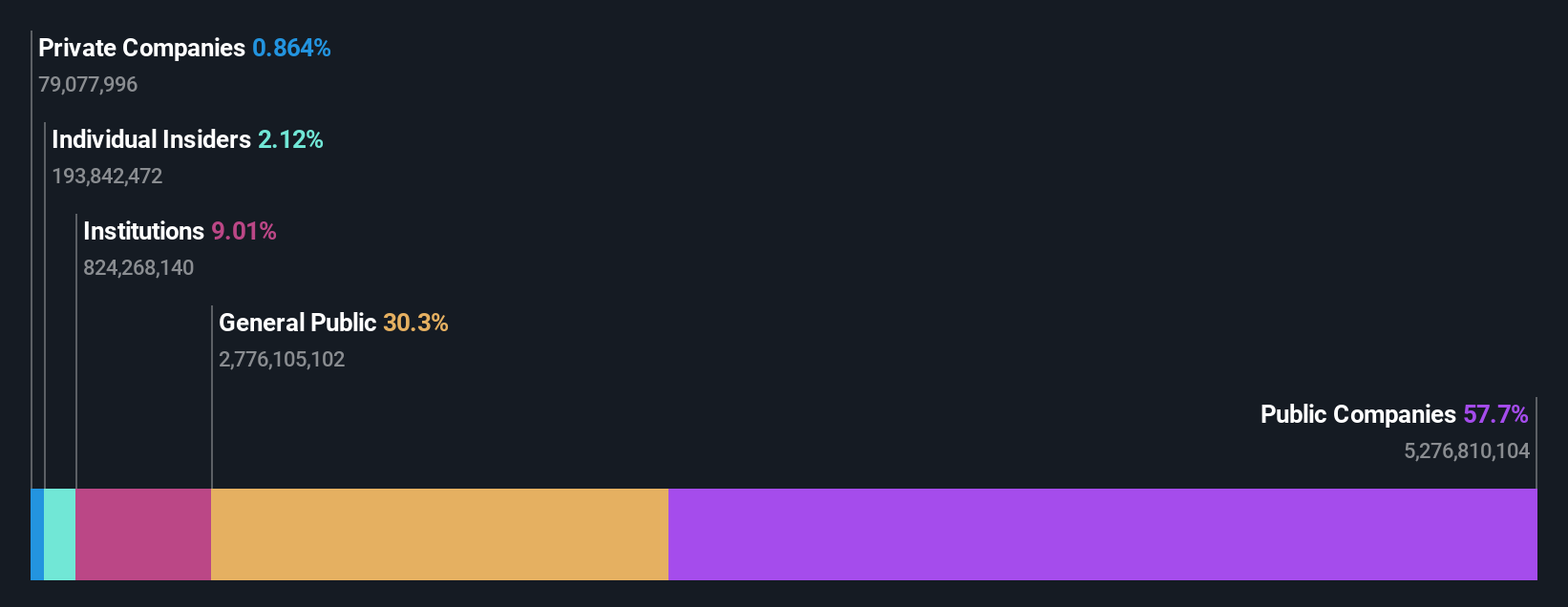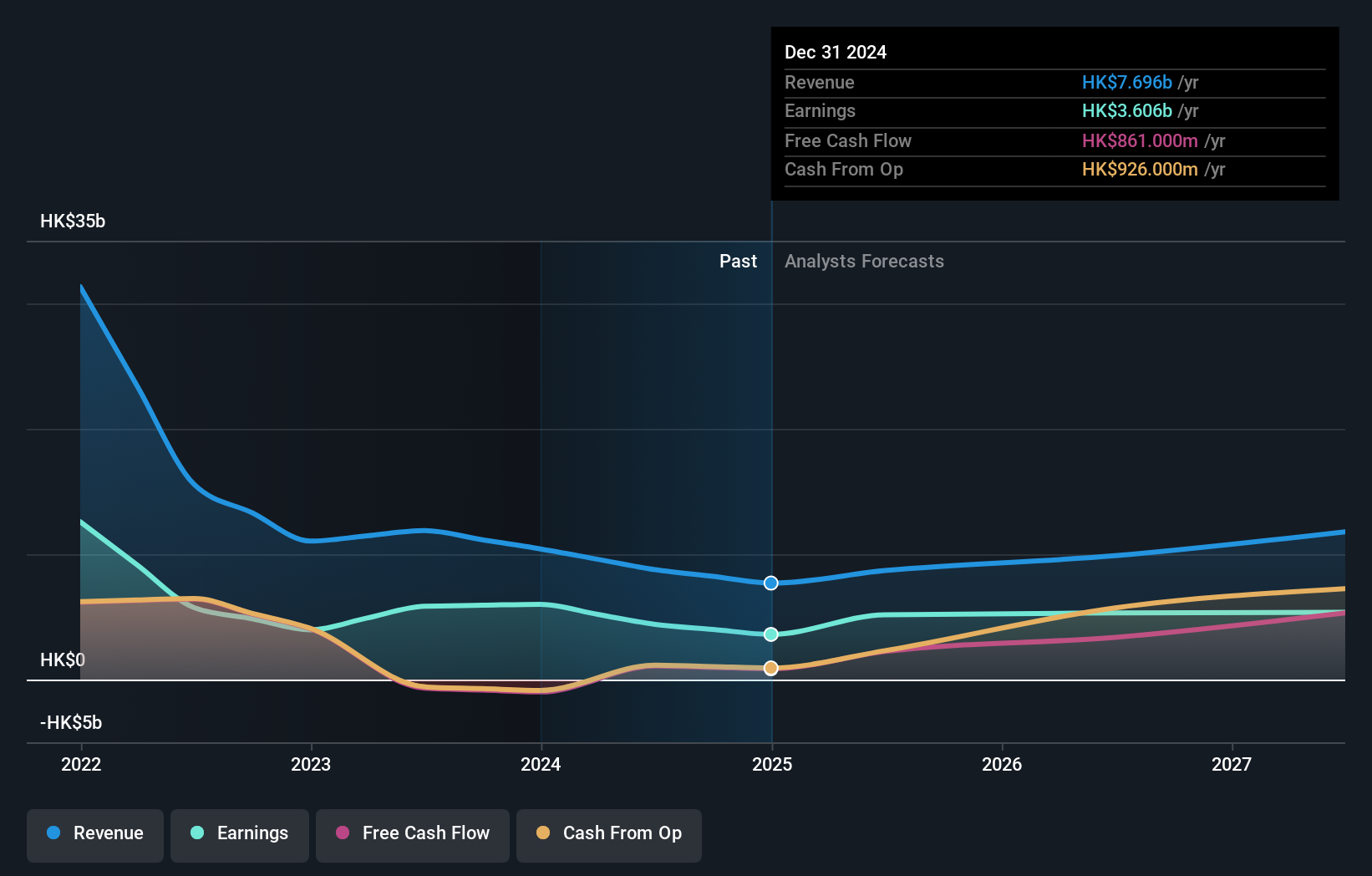Public companies account for 58% of Sino Land Company Limited's (HKG:83) ownership, while individual investors account for 30%
Key Insights
- Sino Land's significant public companies ownership suggests that the key decisions are influenced by shareholders from the larger public
- The largest shareholder of the company is Tsim Sha Tsui Properties Limited with a 58% stake
- Recent purchases by insiders
To get a sense of who is truly in control of Sino Land Company Limited (HKG:83), it is important to understand the ownership structure of the business. The group holding the most number of shares in the company, around 58% to be precise, is public companies. In other words, the group stands to gain the most (or lose the most) from their investment into the company.
And individual investors on the other hand have a 30% ownership in the company.
In the chart below, we zoom in on the different ownership groups of Sino Land.
View our latest analysis for Sino Land

What Does The Institutional Ownership Tell Us About Sino Land?
Institutions typically measure themselves against a benchmark when reporting to their own investors, so they often become more enthusiastic about a stock once it's included in a major index. We would expect most companies to have some institutions on the register, especially if they are growing.
As you can see, institutional investors have a fair amount of stake in Sino Land. This implies the analysts working for those institutions have looked at the stock and they like it. But just like anyone else, they could be wrong. If multiple institutions change their view on a stock at the same time, you could see the share price drop fast. It's therefore worth looking at Sino Land's earnings history below. Of course, the future is what really matters.

We note that hedge funds don't have a meaningful investment in Sino Land. Tsim Sha Tsui Properties Limited is currently the largest shareholder, with 58% of shares outstanding. This essentially means that they have extensive influence, if not outright control, over the future of the corporation. In comparison, the second and third largest shareholders hold about 2.3% and 2.1% of the stock. Chee Siong Ng, who is the third-largest shareholder, also happens to hold the title of Chairman of the Board.
While studying institutional ownership for a company can add value to your research, it is also a good practice to research analyst recommendations to get a deeper understand of a stock's expected performance. There are a reasonable number of analysts covering the stock, so it might be useful to find out their aggregate view on the future.
Insider Ownership Of Sino Land
While the precise definition of an insider can be subjective, almost everyone considers board members to be insiders. Company management run the business, but the CEO will answer to the board, even if he or she is a member of it.
Insider ownership is positive when it signals leadership are thinking like the true owners of the company. However, high insider ownership can also give immense power to a small group within the company. This can be negative in some circumstances.
We can see that insiders own shares in Sino Land Company Limited. It is a very large company, and board members collectively own HK$1.5b worth of shares (at current prices). we sometimes take an interest in whether they have been buying or selling.
General Public Ownership
With a 30% ownership, the general public, mostly comprising of individual investors, have some degree of sway over Sino Land. While this group can't necessarily call the shots, it can certainly have a real influence on how the company is run.
Public Company Ownership
We can see that public companies hold 58% of the Sino Land shares on issue. It's hard to say for sure but this suggests they have entwined business interests. This might be a strategic stake, so it's worth watching this space for changes in ownership.
Next Steps:
I find it very interesting to look at who exactly owns a company. But to truly gain insight, we need to consider other information, too. For instance, we've identified 1 warning sign for Sino Land that you should be aware of.
Ultimately the future is most important. You can access this free report on analyst forecasts for the company.
NB: Figures in this article are calculated using data from the last twelve months, which refer to the 12-month period ending on the last date of the month the financial statement is dated. This may not be consistent with full year annual report figures.
Have feedback on this article? Concerned about the content? Get in touch with us directly. Alternatively, email editorial-team (at) simplywallst.com.
This article by Simply Wall St is general in nature. We provide commentary based on historical data and analyst forecasts only using an unbiased methodology and our articles are not intended to be financial advice. It does not constitute a recommendation to buy or sell any stock, and does not take account of your objectives, or your financial situation. We aim to bring you long-term focused analysis driven by fundamental data. Note that our analysis may not factor in the latest price-sensitive company announcements or qualitative material. Simply Wall St has no position in any stocks mentioned.
Contact Us
Contact Number : +852 3852 8500Service Email : service@webull.hkBusiness Cooperation : marketinghk@webull.hkWebull Securities Limited is licensed with the Securities and Futures Commission of Hong Kong (CE No. BNG700) for carrying out Type 1 License for Dealing in Securities, Type 2 License for Dealing in Futures Contracts and Type 4 License for Advising on Securities.

English